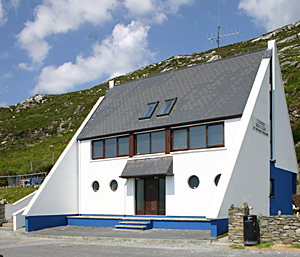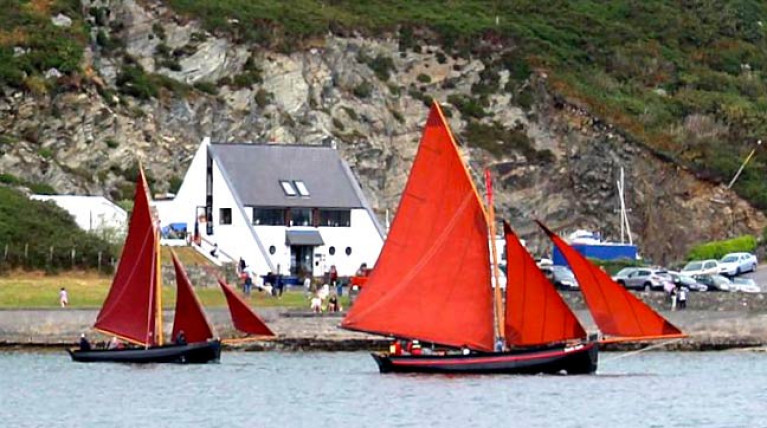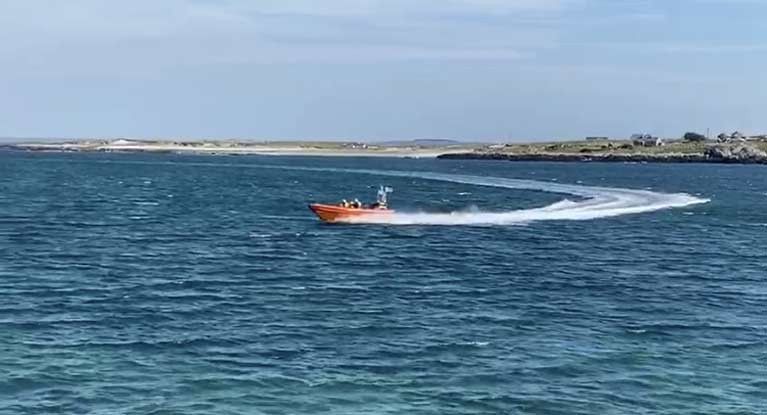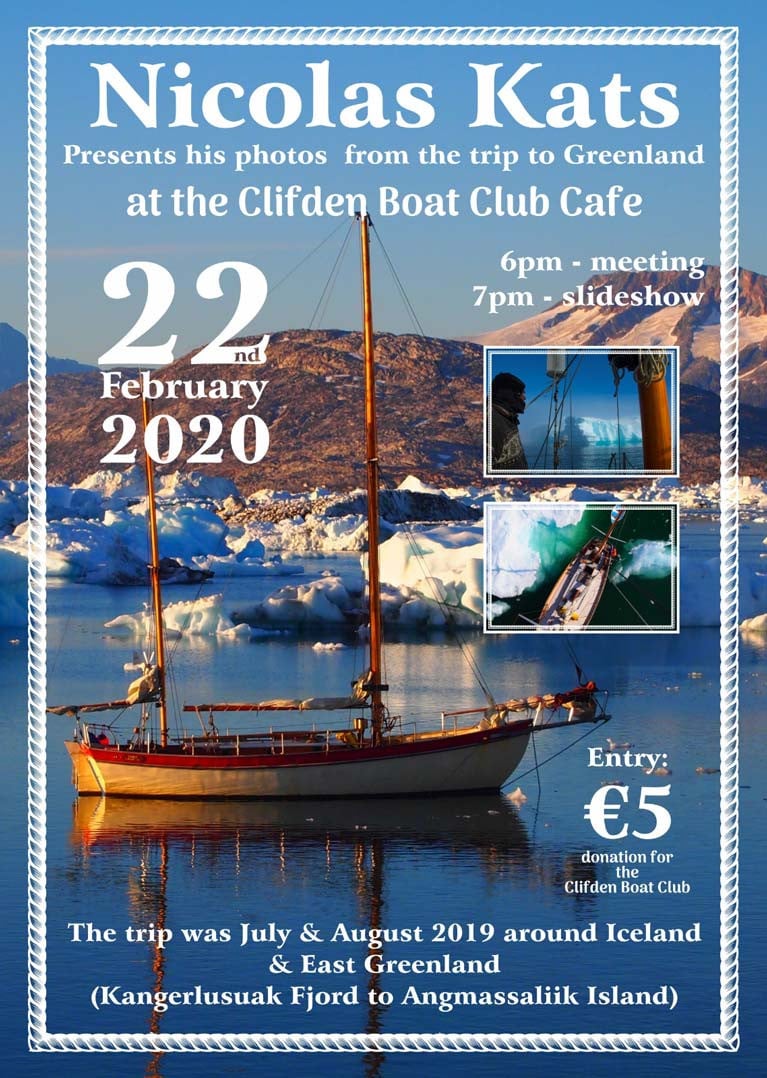Displaying items by tag: Clifden Boat Club
Clifden Boat Club is the primary sailing and boat sports access point for the picturesque town of Clifden, the natural capital of Connemara, the “Land of the Sea” on Ireland’s far west Atlantic coast. While the club’s history goes much further back, this year it celebrated thirty years of being in its “new” clubhouse with a reassembly of many of those who were there for the grand opening back in 1990.
The building – designed by CBC member Liam Clark, who is in both photos – has matured well, looking very much of our time while successfully blending into the hillside which sweeps upwards to the famous Sky Road. The architectural concept was for both gables to look like a yacht under sail, whether you are coming in from the sea or from the town along the shore of the drying Clifden Harbour.
 The Capital of Connemara – Clifden with the sea on its doorstep, and the Twelve Bens beyond
The Capital of Connemara – Clifden with the sea on its doorstep, and the Twelve Bens beyond
 Designed by CBC member Liam Clarke, the 30-year-old clubhouse fulfils its many functions while fitting well with the attractive location
Designed by CBC member Liam Clarke, the 30-year-old clubhouse fulfils its many functions while fitting well with the attractive location
The space within is such that the small but keen membership are able to let part of their premises for a popular eaterie, The Boardwalk Café which – as the delayed 2020 season gets under way – is now being run by Lukasz Langowski, who served with previous chef Simon Trezise for many years.
 The CBC’s main social area doubles as The Boardwalk Café
The CBC’s main social area doubles as The Boardwalk Café
With the Clifden Lifeboat station nearby, CBC is the centre of an active maritime focal point, and while its moorings will not all be filled until August owing to the COVID-19 delays, the club already has training programmes underway, and all the other activities are working through the pipeline.
 Opening day for the new Clubhouse in 1990 Back Row: (left to right) Saul Joyce, Catriona Vine. Peter Vine, John Stanley, the late Paddy McDonagh, Doric Lindemann, Julia Awcock, Liam Clarke (architect) and Barry Ward Middle Row: Susie Ward, Emer Joyce and Jean LeDorvan Front row: Donal O’Scannail, Padraic McCormack, the late Talbot O’Farrell, Jackie Ward, and Adrian O’Connell. Inset Damian Ward, photo courtesy Damian Ward
Opening day for the new Clubhouse in 1990 Back Row: (left to right) Saul Joyce, Catriona Vine. Peter Vine, John Stanley, the late Paddy McDonagh, Doric Lindemann, Julia Awcock, Liam Clarke (architect) and Barry Ward Middle Row: Susie Ward, Emer Joyce and Jean LeDorvan Front row: Donal O’Scannail, Padraic McCormack, the late Talbot O’Farrell, Jackie Ward, and Adrian O’Connell. Inset Damian Ward, photo courtesy Damian Ward
 Cbc_opening_thirty_years_on5.jpg CBC members gather in July 2020 to celebrate thirty years of their successful clubhouse: Back row (left to right) Catriona Vine, Peter Vine, Susie Ward, John Stanley, P J McDonagh, Conor McDonagh, Morvan LeDorvan, Liam Clarke and Barry Ward, Front row: Donal O’Scannaill, Padraic McCormack, Sean O’Farrell, Jackie Ward, Adrian O’Connell and Damian Ward. Insets: Francie Mannion, Saul Joyce, Emer Joyce, Doris Lindemann and Julia Awcock. Photo courtesy Damian Ward
Cbc_opening_thirty_years_on5.jpg CBC members gather in July 2020 to celebrate thirty years of their successful clubhouse: Back row (left to right) Catriona Vine, Peter Vine, Susie Ward, John Stanley, P J McDonagh, Conor McDonagh, Morvan LeDorvan, Liam Clarke and Barry Ward, Front row: Donal O’Scannaill, Padraic McCormack, Sean O’Farrell, Jackie Ward, Adrian O’Connell and Damian Ward. Insets: Francie Mannion, Saul Joyce, Emer Joyce, Doris Lindemann and Julia Awcock. Photo courtesy Damian Ward
While this year’s celebrations are for the opening of the 1990 clubhouse, the club itself may have its origins as far back as 1907, as a silver cup trophy for “Clifden Bay Regatta 1907” was discovered – neatly in time for its Centenary – in 2007. Then two clubs were in existence later in the 1900s – the Clifden Bay Deep Sea Angling Club, and the Clifden Bay Dinghy Sailing Club – but in 1973 they got their act together, and in time had an organisation of sufficient strength – the Clifden Boat Club – to gather the resources and take on the construction of a multi-purpose clubhouse in 1989, its opening in 1990 being a real breakthrough.
 Waiting for the breeze – Intervarsity Fireflies in Clifden for international team racing at CBC
Waiting for the breeze – Intervarsity Fireflies in Clifden for international team racing at CBC
Since then, in addition to its many local activities with the emphasis on junior and adult training, Clifden has hosted events as various as the West of Ireland Offshore Racing Association Annual Championship, which it has staged twice with good turnouts, and the Irish Intervarsities International Championship, the latter – a major dinghy happening – being an event which is noted for choosing out-of-the-way venues of special attraction, so Clifden fitted the bill to perfection.
The club has produced its own top teams, the most successful crew being Jackie Ward with his sons Damian and Barry and their friends who have campaigned the Ron Holland-designed Parker 27 Hallmark to victory all along the western seaboard, with their most noted achievements being class wins in WIORA at Tralee Bay and overall victory in the Dubarry West Coast Superleague.
 West coast stars – Jackie Ward’s successful Clifden-based Ron Holland-designed Parker 27 Hallmark racing in her home waters.
West coast stars – Jackie Ward’s successful Clifden-based Ron Holland-designed Parker 27 Hallmark racing in her home waters.
Clifden being at the heart of a special area which has attracted international visitors who then put down summer roots in the region, Clifden BC also has a significant international membership, and the best-known local connection in cruising is American Nick Kats, who has twice voyaged with his 39-ft ketch Teddy to East Greenland from Clifden.
In top-level offshore racing, another international link is the Gouy family from France, famed father Bernard and his son Laurent, whose determined campaigning of the complete RORC programme with their Ker 39 Inis Mor saw them become RORC Yacht of the Year 2013, while their Irish interest was reflected by Inis Mor listing Clifden Boat Club as her home base for the Round Ireland race from Wicklow, which she contested twice, and won overall in 2012.
 International star – France’s Gouy family with their Ker 39 Inis Mor, the RORC Yacht of the Year in 2013. They nominated Clifden Boat Club as their home base when winning the Round Ireland Race of 2012
International star – France’s Gouy family with their Ker 39 Inis Mor, the RORC Yacht of the Year in 2013. They nominated Clifden Boat Club as their home base when winning the Round Ireland Race of 2012
Like every other sailing and boatsports club in Ireland, Clifden Boat Club is gradually working its way back to a level of activity which is compliant with the changing regulations, while at the same time providing a programme attractive enough for seasoned members and beginner alike to get people back afloat again. The club is in good spirits, and 30 years down the line, the brave move to build a clubhouse carefully designed for Clifden requirements continues to be a matter of justifiable pride.
In this strange summer with its mixed weather, CBC member Damian Ward’s recent drone footage of the club on a sunny morning with a sailing introduction class getting under way reminds us of what Ireland can be like when all the encouraging factors are in place.
Clifden RNLI Lifeboats Respond to Child Swept Out to Sea
Both Clifden RNLI lifeboats were launched to reports of a young child that had been swept out to sea on his surfboard while at the beach with his family in Renvyle shortly after 4.30 pm yesterday.
The offshore wind conditions had changed extremely quickly and the child began to drift further and further away from the shore.
While the RNLI lifeboats were en route to the scene, a local fisherman had made his way to collect the casualty and brought him safely back to shore where he was reunited with his mother.
With the June Bank holiday and fine weather approaching, Community Safety Officer with Clifden RNLI Miryam Harris said ‘With the beautiful weather at the moment, we would encourage everyone to be safe in their seaside activities.
Be sure to check the tides and wind forecast regularly as conditions can change so quickly.
Always try to do your activity with another person, have a means of calling for help with you and wear a life jacket appropriate to your activity. We are all very relieved at the outcome of this launch and well done to the fisherman who came to the aid of this family’.
Arctic Cruising Comes to the Warmth of Clifden on Saturday night
The further west you go in Ireland, the warmer is the hospitality. So despite the current ferocious weather and the fact that Clifden in Connemara is well out into Ireland’s Atlantic frontier, the mood will be friendly and warm in Clifden Boat Club this Saturday night as Commodore Donal O Scannell welcomes members and guests for American skipper Nick Kats’s profusely-illustrated unveiling of his recent Arctic voyaging with his hefty Danish steel-built Bermuda-rigged 39ft ketch Teddy.
It is quite a few years since Nick and Teddy arrived into Clifden for a visit of undefined length, and during that time he has built up a reputation in Connemara for his skills as an acupuncturist and naturopathic doctor. But a return to his home in Oregon by way of the Northwest Passage was always on the horizon. However, it slipped down the agenda as he made exploratory visits to Greenland waters, and became bewitched by the place.
Thus last year’s cruise to the north was clearly made with no intention of trying for the Northwest Passage at all, as it took him to Eastern Greenland and included a circuit of Iceland before returning to Clifden. Just like that. It’s all very remarkable, and if you’re looking for something truly different in Connemara this Saturday night, we strongly recommend a visit to Clifden Boat Club for a unique experience.
Galway J109 Crew are Superleague Performers
Glen Cahill and the crew of the J109 Joie de Vie from Galway Bay Sailing Club were crowned overall winners of the West Coast Super League 2010 in both IRC & Echo at the prize giving held last Saturday night at Foynes Yacht Club.
The Murphy Marine Services sponsored league was an extracted series of seven events on the West Coast of Ireland and is organised by the West of Ireland Offshore Racing Association with the help from various clubs involved which where Galway Bay Sailing Club, Tralee Bay Sailing Club, Clifden Boat Club, Foynes Yacht Club and the Royal Western Yacht Club of Ireland.

Simon Mc Gibney (WIORA Commodore) Glen Cahill, Jennifer Cuddy, Chris Law, Bobbi O Regan (WIORA) Bernard McCarthy. More prizegiving photos below
The events where the Tralee Bay Sailing Club Regatta, West Coast Championships hosted by the Royal Western Yacht Club, O'Sullivan Marine 100 Mile Race, Clifden Boat Club Regatta, Galway Bay Sailing Club Regatta, Northwestern Offshore Racing Association Regatta hosted by Galway Bay Sailing Club and Foynes Yacht Club Regatta.
In excess of sixty boats took part in the various events during the League and the final placing where not decided until the Foynes Yacht Club Regatta was completed.
Joie de Vie had a very impressive season wining Class 1 in no less than four of the seven events including the West Coast Championships and fought off stiff competition from Raymond McGibney's Dehler 34 Disaray from Foynes Yacht Club, who finished overall runner up in both IRC & Echo and Liam Burke's Corby 33 AWOL from Galway Bay Sailing Club who collected the most competed events WIORA Trophy and Rob Allen's Corby 36 Mustang Sally from the Royal Western Yacht Club of Ireland.
Results after all seven events completed -
Overall IRC & ECHO
Overall IRC & ECHO Winner – Glen Cahill's J109 Joie de Vie Galway Bay Sailing Club
Overall IRC & ECHO Runner up - Raymond Mc Gibney Dehler 34 Disaray Foynes Yacht Club
Class Prize & The most competed events WIORA Trophy
Liam Burke's Corby 33 AWOL Galway Bay Sailing Club
Class Prize
Rob Allen Corby 36 Mustang Sally Royal Western Yacht Club of Ireland

Awol: Bobbi O Regan (WIORA) Nigel Thornton, Noreen Mc Carthy, Simon Mc Gibney (WIORA Commodore)

Disaray Crew: Simon Mc Gibney (WIORA Commodore) Edward Enright, Fionn Mc Gibney, Louise Barrett, Rory Mc Gibney, Bobbi O Regan (WIORA) Raymond Mc Gibney

Mustang Sally: Simon Mc Gibney (WIORA Commodore), Rob Allen, Bobbi O Regan (WIORA)
Clifden Boat Club

Clifden Boat Club
The Clifden Boat Club is a small sailing Club situated on the west coast of Ireland, just two miles outside the picturesque town of Clifden, Connemara. The committee and members of the club have been working hard to provide fantastic yacht racing and also some great sail training.
The team at Clifden Boat Club, having hosted the West Coast Championships for 2007 and 2008, are looking forward to another exciting and rewarding sailing season in 2009.
The Club is situated at the eastern end of the very sheltered Clifden bay providing great anchorage and easy access to a slip. Clifden harbour is 1km farther east providing a very safe and sheltered tidal harbour with a draft of about 3m at mean high water. The clubhouse itself is close to the Clifden Bay anchorage and has shower/changing rooms a bar and restaurant. Services Available include Visitors Moorings and safe anchorage.
The following is always
available:
Fresh water 25m from slip
Fuel and Lube oil
available in drums from Clifden town and tanker deliveries to Clifden
quay.
All stores available in Clifden town (2km from clubhouse, 1km from
Clifden quay)
Some spares and mechanical repair available
There is an internet Cafe in Clifden. The Boat Club is available for meetings and conferences by arangement. The First port of call for visitors should be the Clifden Boat Club where facilities are available and where information can be obtained.
Committee Details 2009/2010
Commodore – Bobbi O'Regan 0879870371 [email protected]
Secretary – Damian Ward 0872418569 [email protected]
Treasurer – Bobbi O'Regan 0879870371 [email protected]
Assist. Treasurer - Jackie Ward 09521898
Membership Sec – Donal O'Scannaill 0861665278
Liaison Officer/PRO – Damian Ward
Development Officer – Jackie Ward
Safety Officer – Werner Cook 0876427167
Race Officer/Sailing Sec – Paul Ryan 0862931819































































